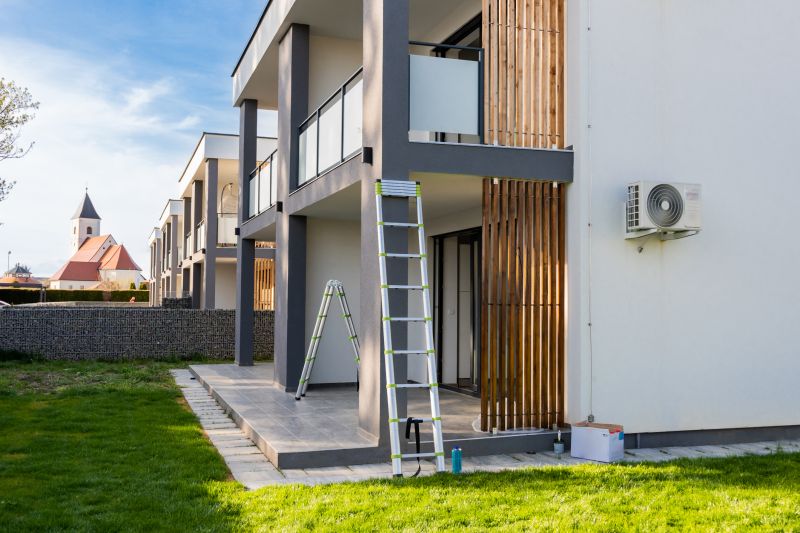Ultimate Product Guide For Balcony Leak Fixes And Maintenance
Get comprehensive insights into essential repair products that keep your balcony leak-free and well-maintained.
 Leaking balconies can pose significant challenges to maintaining the safety and integrity of a building's exterior. Addressing leaks promptly and effectively requires understanding the variety of repair products available and selecting the appropriate solutions for specific situations. Proper repair not only prevents water intrusion but also helps preserve the structural components and aesthetic appeal of the balcony area.
Leaking balconies can pose significant challenges to maintaining the safety and integrity of a building's exterior. Addressing leaks promptly and effectively requires understanding the variety of repair products available and selecting the appropriate solutions for specific situations. Proper repair not only prevents water intrusion but also helps preserve the structural components and aesthetic appeal of the balcony area.
Top Overall Option
Comprehensive Balcony Waterproofing Kit
A versatile waterproofing kit that includes liquid membranes, patching compounds, and primers designed for balcony repairs. Its all-in-one approach simplifies the repair process, making it suitable for a variety of surfaces and leak severity levels. The kit provides durable, flexible protection against water intrusion when applied correctly.
Types of Products For Leaking Balcony Repairs
Liquid Waterproofing Membranes
Flexible liquid coatings that form seamless waterproof barriers on balcony surfaces, ideal for large areas and surface cracks.
Patching Compounds
Ready-mixed or dry patching materials designed to fill cracks, holes, and surface imperfections quickly and effectively.
Sealants and Caulks
Flexible sealants suitable for sealing joints, cracks, and edges to prevent water ingress around railings and fixtures.
Epoxy Resins
High-strength resins used to repair structural cracks and reinforce compromised balcony surfaces.
Polyurethane Foam
Expanding foam used to fill large gaps and voids, providing insulation and waterproofing simultaneously.
Waterproof Coatings
Protective coatings that add a waterproof layer over existing surfaces, often used as a topcoat.
Rubberized Coatings
Flexible, rubber-like coatings that adapt to surface movements, ideal for dynamic cracks.
Bituminous Membranes
Self-adhesive or torch-applied membranes that create durable waterproof layers on balcony surfaces.
Waterproof Tape
Self-adhesive tapes used for quick sealing of cracks and joints, especially in emergency repairs.
Drainage Mats
Protective mats that promote water runoff and prevent pooling on balcony surfaces.
Primer Solutions
Adhesion-promoting primers that prepare surfaces for waterproofing or patching products.
Elastomeric Coatings
Highly flexible coatings that accommodate surface movements and prevent cracking.
Crack Repair Kits
Specialized kits containing everything needed to repair and seal cracks in balcony surfaces.
Waterproofing Paints
Paints formulated with waterproofing agents, suitable for finishing surfaces after repairs.
Foam Backer Rods
Flexible foam rods used to fill deep joints and cracks before sealing with other products.
Concrete Patches
Specialized patches designed for concrete balcony surfaces to restore integrity and prevent leaks.
Popular Choices
Widely used for sealing cracks and joints, offering good flexibility and adhesion for balcony repairs.
A popular option for creating seamless waterproof layers on balcony surfaces prone to movement.
Convenient kits that combine patching compounds and sealants for quick repairs of small leaks.
Commonly used for structural crack repairs, providing durable reinforcement for compromised areas.
Popular for sealing around railings and joints where flexibility is needed.
Favored for its flexibility and durability, suitable for dynamic cracks and surface movements.
Trusted for its durability and strong adhesion, often used in heavy-duty balcony waterproofing.
Easy-to-apply tape for quick sealing of leaks and cracks in balcony surfaces.
Effective in preventing water pooling and promoting runoff on balcony surfaces.
Enhances adhesion of waterproofing products, ensuring better long-term performance.
Widely used for their flexibility and weather resistance, accommodating surface movements.
All-in-one solutions designed for repairing cracks quickly and effectively.
Popular for finishing and protecting repaired surfaces with a waterproof layer.
Commonly used to fill deep joints prior to sealing, ensuring a better seal.
There are numerous products designed to seal, patch, and waterproof balcony surfaces, each suited to different materials, leak severity, and environmental conditions. From liquid membranes to patching compounds, the right product can make a noticeable difference in the longevity of the repair. It is essential to evaluate the existing balcony surface, the source of the leak, and the compatibility of repair materials before proceeding.
Effective balcony repairs often involve a combination of cleaning, surface preparation, and application of the chosen product. For instance, cracks and small holes may be best addressed with specialized patching compounds, while larger areas might benefit from liquid waterproofing membranes that form a seamless barrier. Proper application techniques, such as using primers or multiple coats, can enhance adhesion and durability.
Investing in high-quality repair products can help extend the lifespan of your balcony and reduce the risk of further water damage. Regular inspections and maintenance are also recommended to catch potential issues early. By selecting suitable products and applying them correctly, property owners can improve the resilience of their balconies against leaks and weather-related wear.
Key Buying Considerations
- Assess the severity and extent of the leak before selecting a product.
- Identify the surface material of the balcony to choose compatible repair products.
- Consider the flexibility of the product to accommodate surface movement and cracks.
- Check the product's adhesion properties to ensure it bonds well to existing surfaces.
- Determine whether a liquid membrane, patch, or sealant best suits your repair needs.
- Evaluate weather resistance and curing times to plan repairs during suitable conditions.
- Choose products that offer durable, long-lasting protection against water intrusion.
- Ensure ease of application, especially if DIY repair is intended.
- Review product compatibility with other repair materials being used.
- Consider the size of the area to be repaired to select appropriately sized products.
- Look for products that can be applied in multiple coats if necessary for better coverage.
- Assess the need for primers or surface preparation products for better adhesion.
- Verify if the product is suitable for both horizontal and vertical surfaces.
- Check for any specific safety or handling instructions provided by the manufacturer.
- Determine if the product is suitable for use on aged or previously repaired surfaces.
